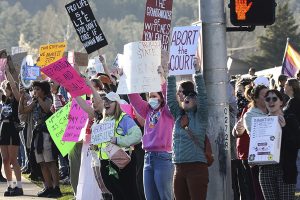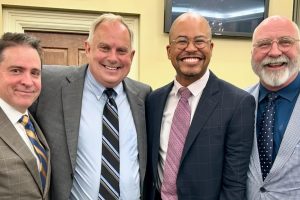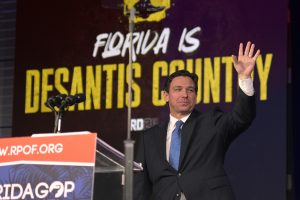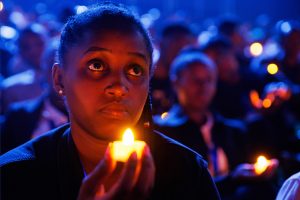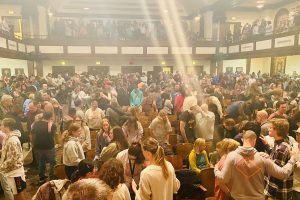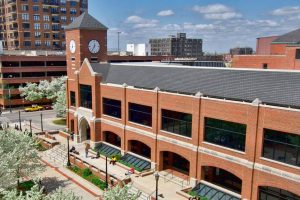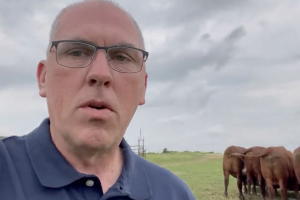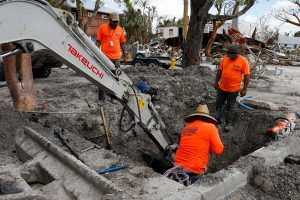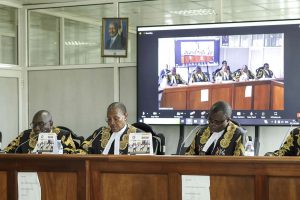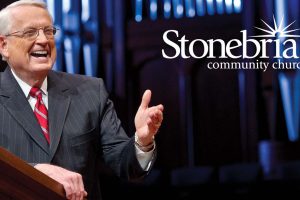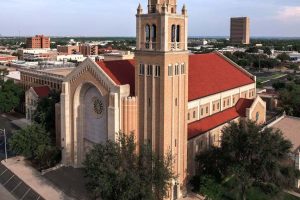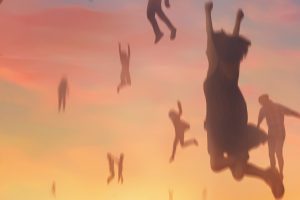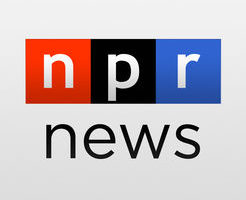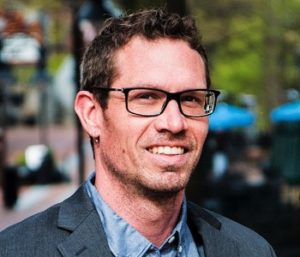 Last Sunday, churches across the United States, many of them still meeting for worship online, were decked in red, ablaze with the image of Pentecostal flames, symbolizing the “tongues, as of fire” ignited by the Holy Spirit (Acts 2:2). Whether separated from one another by six feet on newly cleaned and sanitized pews in churches that chose to reopen or by city blocks or miles in churches that remain closed for in-person worship – all longing for the day when we will be fully re-united – we celebrated the birthday of the Church and rejoiced in the flames of Pentecost that make us One.
Last Sunday, churches across the United States, many of them still meeting for worship online, were decked in red, ablaze with the image of Pentecostal flames, symbolizing the “tongues, as of fire” ignited by the Holy Spirit (Acts 2:2). Whether separated from one another by six feet on newly cleaned and sanitized pews in churches that chose to reopen or by city blocks or miles in churches that remain closed for in-person worship – all longing for the day when we will be fully re-united – we celebrated the birthday of the Church and rejoiced in the flames of Pentecost that make us One.
“Pentecost is a story of political disruption.”
We also witnessed skies ablaze with the image of riotous flames, torching businesses and other buildings in cities across the country. As protests, peaceful and not, began to sweep across the country, President Donald Trump chose the day after Pentecost to stage a photo-op in front of a church, his way cleared in advance by an assault on peaceful demonstrators and expelling clergy who were ministering to the protesters from the church patio.
Though the liturgical irony was certainly lost on him, Trump’s authoritarian display of human power was a vivid contrast to the deeds of God’s power found in the hands of clergy offering a Pentecostal blessing to those thirsty and exhausted by their cries for justice.
While questions remain regarding who, in fact, is perpetuating much of the violence and destruction related to protests nationwide (as well as their motives), we know why and where the protests began – with the organizing of black groups in Minneapolis seeking justice and expressing outrage at racist police brutality. After video surfaced last week of a white police officer choking to death an unarmed black man named George Floyd, the officer’s knee pressed into Floyd’s neck as he lay handcuffed on the pavement; preceded by news accounts of Breonna Taylor, a black EMT asleep in her own bed, shot and killed by police; preceded by the emergence of video of two white men chasing down and shooting to death an unarmed black jogger named Ahmaud Arbery, then black residents of Minneapolis and their allies took to the streets, with some confronting police and some even burning down the Third Police Precinct building where the four officers involved in Floyd’s killing worked.

Fibonacci Blue / CC BY (https://creativecommons.org/licenses/by/2.0)
George, Breonna and Ahmaud, as well as Michael, Eric, Philando and Sandra before them – all deaths at the hands of those sworn to serve and protect or those whose stand-your-ground racism tells them they are; all deemed guilty by the cruel justice of white supremacy; all products, as theologian Kelly Brown Douglas notes, of the gospel of American exceptionalism, the violence of a system that has surveilled, controlled and tortured black bodies since the first slave ships landed in Jamestown 400 years ago. The peaceful marches, the kneeling during the national anthem, the blocking of streets; it had all been too much for too long with too little progress.
Then, on Pentecost, the sun turned to darkness and the moon to blood (Acts 2:20). The flames of protest lit up the night sky and burned down a symbol of oppression and control, a workplace like many others across America where persons of power quite literally have had their knees on the necks of African Americans for far too long.
The fact that these events have transpired against the backdrop of the coronavirus pandemic only intensifies the racial significance of this moment and underscores what is at stake. This pandemic, in which we are all “in this together,” has revealed that we are not all in this equally. Though the virus is biologically colorblind, the fact that it has disproportionately impacted black and brown bodies displays the fallacy of social and political colorblindness. These communities are haunted by the invisible specter of disease and further traumatized by the all-too-visible specter of lynchings, whether at the hands of law enforcement or white vigilantes.
For those like me, who are able to view these events from the comfort of a quarantine couch with frequent Netflix distractions, it may be easy to chastise protesters for not expressing their anger and frustration “in the right way.” For white Christians more concerned about reopening church buildings than resisting racial injustice, it might be easy to forget that the Prince of Peace angrily flipped over a few tables in the marketplace in his day.
“We white Christians must ask: Is it possible for the fire of Pentecost to appear in the flames of riots?”
So, I write this as a white, pacifist Christian primarily to other white Christians who, seeing flaming images on TV or social media, might be asking if riots can ever be justified. I write this as a theologian who believes that the liturgical calendar has something to teach us. Indeed, we white Christians must ask: Is it possible for the fire of Pentecost to appear in the flames of riots?
In response to the upheaval of recent weeks, social media has been circulating again the words of Martin Luther King Jr. in a 1967 speech: “a riot is the language of the unheard.” But, in that address, King continued:
“And what is it that America has failed to hear? It has failed to hear that the plight of the Negro poor has worsened over the last few years. It has failed to hear that the promises of freedom and justice have not been met. And it has failed to hear that large segments of white society are more concerned about tranquility and the status quo than about justice, equality, and humanity.”
As we reflect on the fiery Pentecostal Spirit that unites us in a common language and allows us to hear one another across our differences, we would do well to ask ourselves, “What have we failed to hear?” Preoccupied with our own concerns and blind to the intensity of racial suffering around us, we have, in the words of James Cone, failed to “hear the cry of black blood.” We have failed one of the first and most basic demands of scripture – to be our brother’s and sister’s keeper (Genesis 4:9-10).
Cone reminds us that our “brother’s blood is crying out from the ground.” His throat is gasping for air beneath the knee of a cop. His eyes are burning from the tear gas of police in riot gear. His voice is hoarse from asking if anyone hears.
Pentecost is the language of the unheard. Its story is one of people united across different races, ethnic groups and political divisions, truly hearing one another in each person’s own language, on each person’s own terms. As theologian Willie Jennings teaches us, by speaking the language of people of other nationalities, ethnicities and political identities at its very first gathering that day, the Church was instituted as a body that crossed political and racial lines. The Church was a raucous riot from its beginning, causing some to sneer and others to question the sobriety of those gathered (2:13), transgressing boundaries and enabling resistance to authority as it “upsets the particular ideological arrangements of nations, peoples, and corporations.”
Pentecost is a story of political disruption. Like the protests we see on television, it was not civil (civility is a privilege of those who have other choices), and it was never meant to be. Rather, it is a movement enjoining all of us to join God’s work of saving the poor, traumatized and oppressed.
“This pandemic, in which we are all ‘in this together,’ has revealed that we are not all in this equally.”
Pentecost reminds us to ask: What we have failed to hear and to whom we have failed to listen? Who are the unheard among us that have reached the end of the rope, who have spoken the language of equality and peaceful protest for too long and see no other choice but to speak the fiery righteous rhetoric of rioting?
The riotous fire of a burning police precinct might not be the Pentecostal flame many of us expected, and that itself is a failure of white Christians to listen to the suffering around us.
The righteous, riotous fire of Pentecost signals that the Spirit of God will not be contained within our church buildings. In fact, she might have left those buildings long before COVID-19 forced us to do the same. She may be a fire burning through the streets, setting ablaze symbols of empire, authority and oppression; casting off the knees and nooses that crush the necks of the oppressed; and calling us all to join in solidarity, hearing the voices of the unheard, united in the struggle for justice and speaking about God’s deeds of power.
Related opinion:
Wendell Griffen | Justice for George Floyd: what went wrong and how to make it right
Andrew Manis | George Floyd and the silence of white evangelical America
Kris Aaron | Will we white Christians continue to ignore the pleas of our black brothers and sisters?
Susan M. Shaw | ‘I can’t breathe’: three words that capture the crushing weight of systemic racism in America
Cody J. Sanders | ‘We can’t breathe’: an apt Pentecost prayer for white Christians
Timothy Peoples | Ahmaud, Breonna, Christian, George, and The Talk every black boy receives

















